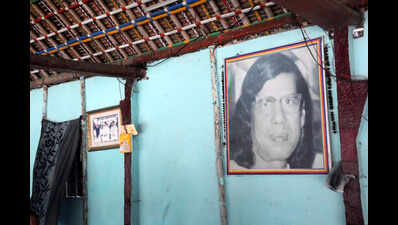ARTICLE AD BOX

Aurahi-Hingna (Araria): Driving through the serpentine stretches of NH-27 from Purnia to Forbesganj, the road veers sharply left at Renu Gate. Beyond it, a narrow path winds through lush paddy fields, shaded groves and quiet hamlets, leading to a small village that once nurtured one of Hindi literature’s most celebrated voices – Phanishwar Nath Renu.As one enters this sleepy village, the air resonates with nostalgia. The ringtone of “Sajan re jhooth mat bolo, khuda ke paas...” from the iconic film ‘Teesari Kasam’, based on Renu’s short story ‘Mare Gaye Gulfam’, drifts out from the cellphones of villagers. The song, immortalised by Raj Kapoor and Waheeda Rehman, directed by Basu Bhattacharya, remains a living echo of Renu’s art and the rustic world he so tenderly portrayed.
Part of the film was shot near this village and at Purnia’s Gulabbagh, locals proudly recall.Yet, beneath this cultural glow lies a disheartening reality. The village that once inspired a literary revolution today lies forgotten with its lanes clogged with mud, homes made of bamboo and thatch and its people still struggling for basic amenities. There is no plaque, no monument, no sign to tell visitors that this was once home to the great author of ‘Maila Aanchal’, ‘Parti Parikatha’, ‘Kite Chaurahe’, ‘Paltu Babu Road’ and ‘Juloos’.
Even the presence of Renu’s own son, Padam Parag Roy Venu, who represented the constituency in 2010, did little to alter the village’s fate. Despite his political tenure, the settlement remains mired in poverty and neglect. The village, falling under the Forbesganj assembly constituency, has almost consistently elected BJP legislators since 1990 – barring 2000, when Bahujan Samaj Party’s Zakin Hussain Khan briefly broke the streak.Locals are bitter about the decades of empty promises. “Renu gaon jhopadi rahi chhai... Sab jhuth baji ke chali gelai (Renu’s village still lives in huts; politicians vanished after making false promises),” said Gauri Devi, her voice thick with resentment. She added that whatever little improvement they see has come through their own efforts, not from those in power.Vijay Kumar, a mason who migrates seasonally to Haryana for work, pointed towards the sludge-filled bylanes.
“The lanes flood during every rain as there are no drains. Kya dikkat, kya pareshani, kaun puchha hai (Who cares about our problems)? They only come for our votes,” he said.Local ward member Ramanand Mandal echoed the frustration. “Netas have told only lies... they claimed to do this and that but have done nothing. We voted for them because they were local, but they always cheated us. We have been left to fend for ourselves,” he said.Venu, Renu’s son and a former MLA, admitted to his own disillusionment. He said he had placed several demands before the govt during his tenure, but most remained unfulfilled. “The party denied me a ticket even though I was a sitting MLA and had the support of the villagers,” Venu alleged. “I have stopped making demands now. I do not like begging,” he said.The neglect is visible even in the supposed symbols of remembrance. A decade ago, the state govt constructed the Renu Smriti Bhawan in honour of the literary icon – a double-storey building with six rooms and four halls – yet it stands unopened and unused to this day. “It has not been inaugurated yet. If it had been, Renu’s works could have been kept there for the public to read,” said local resident Manvendra Kumar, gazing at the locked gates gathering dust.

 1 hour ago
4
1 hour ago
4








 English (US) ·
English (US) ·